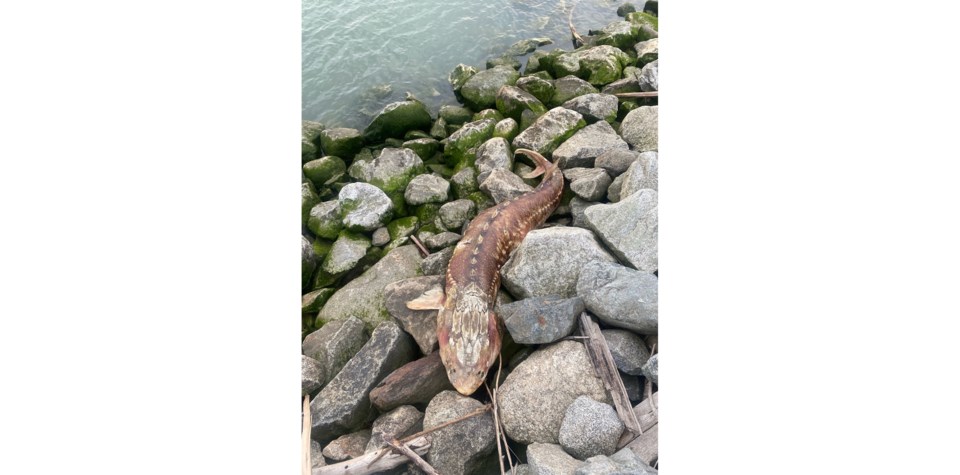A Steveston beachcomber and artist, who makes art out of things he finds along the Fraser River, came across a dead sturgeon on one of his recent walkabouts.
Steve LaRocca found the sturgeon – measuring about seven feet in length –on the riprap at the bottom of No. 3 Road, close to “Bark Park,” the newly refurbished dog park.
LaRocca said the white sturgeon was “absolutely majestic” – although it was rotting and smelly and was discoloured.
“I think it’s important to honour that kind of stuff,” he said of the sturgeon.
LaRocca finds a few dead sturgeon every year while walking along the riverfront, but sometimes they’ve been severely damaged and chopped into pieces by, he surmised, propellors.
For LaRocca, it’s important to document what he finds while beachcombing, but because he’s “not into gore,” he doesn’t post photos of mutilated fish.
LaRocca, who posts his art and photos of interesting objects he finds along the Steveston waterfront on the Twitter handle @FraserRiverFind, posted a video of the sturgeon on TikTok.
@fraserriverfinds An expired sturgeon along the Fraser River in Richmond, BC. About 7 ft long 🙏🏼 #fraserriverfinds #sturgeon #fraserriver #marinelife #rip #richmondbc #bigfish #restinpeace #fraserriversturgeon #aquaticlife #deadfish #savethefraser #savethefish #☠️ ♬ The Council of Elrond (feat. "Aniron") [Theme for Aragorn and Arwen] - Howard Shore
Sturgeon can live up to 100 years, and are considered dinosaur fish as fossil records show they’ve changed very little over millions of years.
They are found in the watersheds of the Fraser, Columbia and Sacramento river basins.
Over the past few weeks, 11 dead sturgeons were found in the Nechako, and scientists are trying to figure out how they died.
Their bodies showed no visible external injuries and provincial scientists didn’t believe the deaths were caused by disease, chemical exposure, angling or gillnet fisheries, the Ministry of Land, Water and Resource Stewardship said.
- With files from Canadian Press

.png;w=120;h=80;mode=crop)


